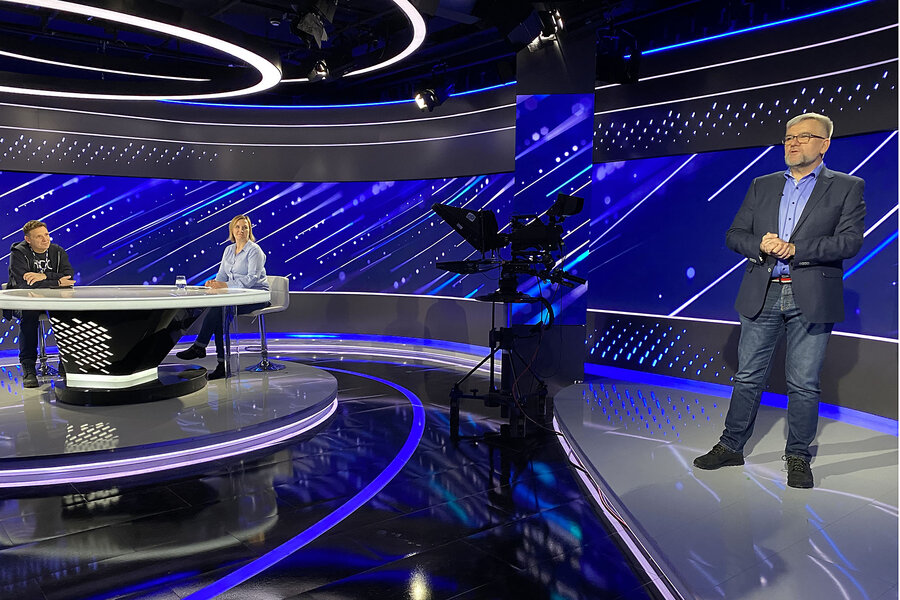‘Expecting goodness to prevail,’ journalists clean up Poland’s state media
Loading...
| Warsaw, Poland
When Poland’s Law and Justice party took office in 2016, it swept the old staff from public broadcasters and installed party loyalists. The airwaves quickly filled with propaganda and antagonism of people the government disfavored.
So when centrists came back to power in elections last October, it left an unprecedented cleanup job behind in the halls of TVP, Poland’s state television channel.
Why We Wrote This
A story focused onHow do you restore faith in a public broadcaster that had been a tool of government spin? That’s the challenge facing Polish journalists at TVP, the state TV channel, after eight years of polarized coverage.
“In my mind I had this thought,” says Maciej Czajkowski, a news editor fired in 2016, now back at TVP. “If there’s a chance to restore democracy and I can take a part in it, and share my knowledge and experience, I have to be here.”
Changing the tenor of what’s being aired has been a top priority. “We changed the language, that was the first thing,” says Paweł Płuska, editor in chief for TVP’s evening news program. “There is no hatred, no poison, no hate. Secondly, we recognized that this is public television, so all groups, even those that do not recognize us, have their place here. We explain to people that patriotism does not mean that you are a member of one party.”
When the right-wing Law and Justice party came to power in Poland in 2016, Maciej Czajkowski lost everything.
Then one of the most senior editors working in state television, he was swept out the door with all the other journalists committed to impartiality. He wears that firing as a badge of honor.
“I’m proud because Piotr Kraśko [one of Poland’s most popular news presenters] got fired first and 15 minutes later I was fired,” says Mr. Czajkowski. “We kept our independence. We wouldn’t have been able to work for Law and Justice.”
Why We Wrote This
A story focused onHow do you restore faith in a public broadcaster that had been a tool of government spin? That’s the challenge facing Polish journalists at TVP, the state TV channel, after eight years of polarized coverage.
Now, with centrists coming back to power after October’s elections, the conditions were right for Mr. Czajkowski’s return. And his first day, back in December, was full of heartbreak, emotion – and hope. “In my mind I had this thought – if there’s a chance to restore democracy and I can take a part in it, and share my knowledge and experience, I have to be here,” he says.
Law and Justice had installed party loyalists and filled the airwaves with propaganda, and cleaning up after populist rule was a job unprecedented. That duty drew Paweł Płuska to leave a 22-year career in commercial television to join TVP, Poland’s state television channel.
“From the public’s point of view, many people were expecting goodness to prevail,” says Mr. Płuska, now editor in chief for TVP’s evening news program, with Mr. Czajkowski working alongside him. “It was unacceptable for them that people are being ostracized, singled out, and destroyed and that public television is participating in all this. That’s why I decided to come here and change it. Because it was a nightmare that one needed to finally wake up from.”
“Tickers of terror”
Under Law and Justice’s eight-year reign, the airwaves were shockingly polarized for anyone accustomed to a tradition of impartial media.
Television presenters called the opposition dirty names and spread falsehoods about them. Donald Tusk, at the time a former Polish prime minister and a sitting president of the European Council, was regularly presented as a German agent. The LGBTQ+ community was referred to as “an ideology” bent on destroying Poland. Stories with heavily loaded titles such as “Who is against sovereign and strong Poland?” or “Defenders of pedophiles and deadbeat dads oppose the reform of the judiciary” were commonplace.
“With these ‘tickers of terror’ they were telling people what to think,” says Mr. Płuska. Those who strayed from conservative party lines were “not only ... not patriots, but ... they are not Poles, because a real Pole must vote for Law and Justice.”
Presenters pursued Paweł Adamowicz, the popular liberal mayor of Gdansk and a vocal critic of Law and Justice, whom the government was investigating for concealing real estate assets. In 2019, Mr. Adamowicz was stabbed to death during a public charity event. His family decried state media for spreading hate about him, as it was speculated that the assassin might have been influenced by the TVP coverage.
On the whole, Law and Justice’s rule was a dark time for Polish media. According to Reporters Without Borders’ World Press Freedom Index, Poland had one of the world’s freest media environments in 2015, the year before Law and Justice took power. That year, Poland (at 18) ranked freer than the United Kingdom (34), France (38), and the United States (49). By 2023, when Law and Justice finally left office, Poland had dropped to 57th.
Hard choices
A centrist coalition formed in mid-December after voters sent Law and Justice out of the majority, and the new government immediately set out to shake up the public broadcasters, though not without legal controversies. It abruptly changed out management and staff, as Mr. Tusk, now prime minister once again, proclaimed an impartial state media would be a “Christmas present for society.” Law and Justice legislators and supporters staged a sit-in, protesting new management’s takeover.
“It was faced with very hard choices,” says Weronika Kiebzak, legal analyst at the policy analysis firm Polityka Insight, of the way Mr. Tusk took back state media. “These changes in the public media were very anticipated by the electorate.”
“The first days, there were a lot of emotions because we had to deliver an impartial program,” says Mr. Płuska. “We had to show obviously both sides of the political scene.”
The changeover has involved some turbulence. Today the security presence is obvious. Barriers encircle the media complex at key access points, security badges are required to enter and exit various corridors, and police populate the hallways.
Mr. Płuska and his managers don’t know exactly which staffers in the building remain loyal to Law and Justice. One night under new management, staffers found transmission cables unplugged in the control room. Whether meant as a joke or an attempt at sabotage, it unnerved staff.
“We don’t know who’s here,” says Mr. Płuska. “Someone did it. We don’t know who it is. We’ve definitely violated many interests that have been [installed] over the last eight years – there are people who wouldn’t want any change.”
Much else is still puzzling, particularly the billions of zlotys funneled to state media under Law and Justice. Some of it was used to pay for increased salaries under Law and Justice and for analysts and loyalists to appear on programs – a journalistic taboo.
But much is still unaccounted for, says Mr. Płuska. “What happened to the 3 billion zlotys [$750 million]?” he asks, referring to the amount budgeted for 2023. Indeed, an audit released in October found that TVP had been a “publicly funded Byzantium” with mismanagement of civil contracts, conflicts of interest, unnecessary costs, and more. A staffer who worked under both governments divulged stories of all-night ragers during Law and Justice rule.
Changing the tenor of what’s being aired was a top priority. “We changed the language, that was the first thing,” says Mr. Płuska, who hasn’t yet moved into his new office, which has only one framed photo and a coffee mug of his own.
“There is no hatred, no poison, no hate. Secondly, we recognized that this is public television, so all groups, even those that do not recognize us, have their place here. We explain to people that patriotism does not mean that you are a member of one party.”
That means that Mr. Płuska must also invite Law and Justice politicians. Yet Paweł Jabłoński, a Law and Justice member of parliament representing Poland’s industrial south, criticizes the way the new government took back the media.
He maintains that the public held an unfair image of “biased” state media under his party’s rule. “People who weren’t our supporters were rejecting it from the outset, without even getting familiar with what the content was,” says Mr. Jabłoński, who adds he’s not yet been invited on-air.
Abandoning the language of hate
Recently, staffers have been making amends for the polarized broadcasts under Law and Justice in the name of healing the nation.
In early February, a news anchor made an emotional apology to the nation for the attacks on the LGBTQ+ community during Law and Justice’s tenure. Management has also apologized for the attacks on the late mayor of Gdansk.
“No television, no news program should ever use the language of hate, and hate, it cannot destroy people or fuel bad emotions in society. We have just seen what such language led to,” remarked host Zbigniew Łuczyński on the evening program.
Mr. Czajkowski’s homecoming has been particularly emotional, especially as he was targeted by Law and Justice. “I was a perfect enemy for them, representing impartiality in media. I’m gay. My boyfriend is Black. Every day I was the perfect enemy,” he says.
But ultimately, Mr. Płuska and Mr. Czajkowski made the decision to give people a second chance. “Those who lent their face to the regime obviously had to go,” but “we decided to give a chance to people who weren’t directly involved,” says Mr. Czajkowski.
Many had families to feed and needed a job, even if Law and Justice was in power, he points out. “Who are we to judge them?”
Piotr Zakowiecki contributed to this report.









